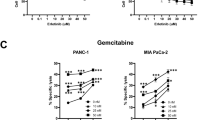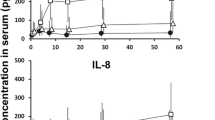Abstract
Second-line chemotherapy in patients with gemcitabine-refractory advanced pancreatic cancer has shown disappointing survival outcomes due to rapid disease progression and performance deterioration. The aim of this phase II trial was to evaluate the efficacy and safety of adoptive immunotherapy using ex vivo-expanded, cytokine-induced killer (CIK) cells in gemcitabine-refractory advanced pancreatic cancer. Patients with advanced pancreatic cancer who showed disease progression during gemcitabine-based chemotherapy were enrolled in this study. For generation of CIK cells, peripheral blood samples were collected from each patient and cultured with anti-CD3 monoclonal antibody and IL-2. Patients received CIK cells intravenously 10 times, every week for 5 weeks and then every other week for 10 weeks. Twenty patients were enrolled between November 2009 and September 2010. The disease control rate was 25 % (4/16 patients). The median progression-free survival (PFS) was 11.0 weeks (95 % CI 8.8–13.2), and the median overall survival (OS) was 26.6 weeks (95 % CI 8.6–44.6). Grade 3 toxicities included general weakness in two patients and thrombocytopenia in one patient. Grade 4 hematologic or non-hematologic toxicity was not observed. Patients showed improvement in pancreatic pain, gastrointestinal distress, jaundice, body image alterations, altered bowel habits, health satisfaction, and sexuality when assessing quality of life (QoL). Adoptive immunotherapy using CIK cells showed comparable PFS and OS to survival data of previous trials that assessed conventional chemotherapies while maintaining tolerability and showing encouraging results in terms of patient QoL in gemcitabine-refractory advanced pancreatic cancer (clinicalTrials.gov number NCT00965718).


Similar content being viewed by others
Abbreviations
- CIK cells:
-
Cytokine-induced killer cells
- CA 19-9:
-
Carbohydrate antigen 19-9
- CIs:
-
Confidence intervals
- DCR:
-
Disease control rate
- ECOG-PS:
-
Eastern Cooperative Oncology Group performance status
- EORTC:
-
European Organization for Research and Treatment of Cancer
- FACS:
-
Fluorescence-activated cell sorting
- HCC:
-
Hepatocellular carcinoma
- INR:
-
International normalized ratio
- ITT:
-
Intention-to-treat
- MHC:
-
Major histocompatibility complex
- OFF:
-
Oxaliplatin, folinic acid, and 5-FU
- OS:
-
Overall survival
- PBMCs:
-
Peripheral blood mononuclear cells
- PD:
-
Progressive disease
- PFS:
-
Progression-free survival
- PP:
-
Per-protocol
- QLQ-C30:
-
Quality of Life Questionnaire Core 30
- QLQ-PAN26:
-
Quality of Life Questionnaire Core 30 in patients with pancreatic cancer
- QoL:
-
Quality of life
- SD:
-
Stable disease
- VAS:
-
Visual analog scale
References
National Cancer Information Center (2013) Cancer Information Service National Cancer Information Center. http://www.cancer.go.kr/mbs/cancer/subview.jsp?id=cancer_040201000000. Accessed 12 Aug 2013
Geer RJ, Brennan MF (1993) Prognostic indicators for survival after resection of pancreatic adenocarcinoma. Am J Surg 165:68–72
Colucci G, Labianca R, Di Costanzo F, Gebbia V, Cartenì G, Massidda B et al (2010) Randomized phase III trial of gemcitabine plus cisplatin compared with single-agent gemcitabine as first-line treatment of patients with advanced pancreatic cancer: the GIP-1 study. J Clin Oncol 28:1645–1651
Moore MJ, Goldstein D, Hamm J, Figer A, Hecht JR, Gallinger S et al (2007) Erlotinib plus gemcitabine compared with gemcitabine alone in patients with advanced pancreatic cancer: a phase III trial of the National Cancer Institute of Canada Clinical Trials Group. J Clin Oncol 25:1960–1966
Van Cutsem E, Vervenne WL, Bennouna J, Humblet Y, Gill S, Van Laethem J et al (2009) Phase III trial of bevacizumab in combination with gemcitabine and erlotinib in patients with metastatic pancreatic cancer. J Clin Oncol 27:2231–2237
Philip PA, Benedetti J, Corless CL, Wong R, O’Reilly EM, Flynn PJ et al (2010) Phase III study comparing gemcitabine plus cetuximab versus gemcitabine in patients with advanced pancreatic adenocarcinoma: Southwest Oncology Group-directed intergroup trial S0205. J Clin Oncol 28:3605–3610
Pelzer U, Schwaner I, Stieler J, Adler M, Seraphin J, Dörken B et al (2011) Best supportive care (BSC) versus oxaliplatin, folinic acid and 5-fluorouracil (OFF) plus BSC in patients for second-line advanced pancreatic cancer: a phase III-study from the German CONKO-study group. Eur J Cancer 47:1676–1681
Jin J, Joo KM, Lee SJ, Jo M, Kim Y, Jin Y et al (2011) Synergistic therapeutic effects of cytokine-induced killer cells and temozolomide against glioblastoma. Oncol Rep 25:33–39
Mesiano G, Todorovic M, Gammaitoni L, Leuci V, Giraudo Diego L, Carnevale Schianca F et al (2012) Cytokine-induced killer (CIK) cells as feasible and effective adoptive immunotherapy for the treatment of solid tumors. Expert Opin Biol Ther 12:673–684
Hontscha C, Borck Y, Zhou H, Messmer D, Schmidt-Wolf IG (2011) Clinical trials on CIK cells: first report of the international registry on CIK cells (IRCC). J Cancer Res Clin Oncol 137:305–310
Oken MM, Creech RH, Tormey DC, Horton J, Davis TE, McFadden ET et al (1982) Toxicity and response criteria of the Eastern Cooperative Oncology Group. Am J Clin Oncol 5:649–655
Schmidt Wolf IG, Negrin RS, Kiem HP, Blume KG, Weissman IL (1991) Use of a SCID mouse/human lymphoma model to evaluate cytokine-induced killer cells with potent antitumor cell activity. J Exp Med 174:139–149
Kim HM, Lim J, Yoon YD, Ahn JM, Kang JS, Lee K et al (2007) Anti-tumor activity of ex vivo expanded cytokine-induced killer cells against human hepatocellular carcinoma. Int Immunopharmacol 7:1793–1801
Kim HM, Lim J, Park S, Kang JS, Lee CW, Lee KH et al (2007) Antitumor activity of cytokine-induced killer cells against human lung cancer. Int Immunopharmacol 7:1802–1807
Sekine T, Shiraiwa H, Yamazaki T, Tobisu K, Kakizoe T (1993) A feasible method for expansion of peripheral blood lymphocytes by culture with immobilized anti-CD3 monoclonal antibody and interleukin-2 for use in adoptive immunotherapy of cancer patients. Biomed Pharmacother 47:73–78
Sun Z, Shi L, Zhang H, Shao Y, Wang Y, Lin Y et al (2011) Immune modulation and safety profile of adoptive immunotherapy using expanded autologous activated lymphocytes against advanced cancer. Clin Immunol 138:23–32
Eisenhauer EA, Therasse P, Bogaerts J, Schwartz LH, Sargent D, Ford R et al (2009) New response evaluation criteria in solid tumours: revised RECIST guideline (version 1.1). Eur J Cancer 45:228–247
Aaronson NK, Ahmedzai S, Bergman B, Bullinger M, Cull A, Duez NJ et al (1993) The European Organization for Research and Treatment of Cancer QLQ-C30: a quality-of-life instrument for use in international clinical trials in oncology. J Natl Cancer Inst 85:365–376
Fitzsimmons D, Johnson CD, George S, Payne S, Sandberg AA, Bassi C et al (1999) Development of a disease specific quality of life (QoL) questionnaire module to supplement the EORTC core cancer QoL questionnaire, the QLQ-C30 in patients with pancreatic cancer. EORTC Study Group on Quality of Life. Eur J Cancer 35:939–941
Trotti A, Colevas AD, Setser A, Rusch V, Jaques D, Budach V et al (2003) CTCAE v3.0: development of a comprehensive grading system for the adverse effects of cancer treatment. Semin Radiat Oncol 13:176–181
Boeck S, Weigang Köhler K, Fuchs M, Kettner E, Quietzsch D, Trojan J et al (2007) Second-line chemotherapy with pemetrexed after gemcitabine failure in patients with advanced pancreatic cancer: a multicenter phase II trial. Ann Oncol 18:745–751
Demols A, Peeters M, Polus M, Marechal R, Gay F, Monsaert E et al (2006) Gemcitabine and oxaliplatin (GEMOX) in gemcitabine refractory advanced pancreatic adenocarcinoma: a phase II study. Br J Cancer 94:481–485
Kulke MH, Blaszkowsky LS, Ryan DP, Clark JW, Meyerhardt JA, Zhu AX et al (2007) Capecitabine plus erlotinib in gemcitabine-refractory advanced pancreatic cancer. J Clin Oncol 25:4787–4792
Oh SY, Kim HJ, Kim TH, Lee G, Jeong C, Kwon H et al (2010) Pilot study of irinotecan/oxaliplatin (IROX) combination chemotherapy for patients with gemcitabine- and 5-fluorouracil-refractory pancreatic cancer. Invest New Drugs 28:343–349
O’Reilly EM, Niedzwiecki D, Hall M, Hollis D, Bekaii Saab T, Pluard T et al (2010) A Cancer and Leukemia Group B phase II study of sunitinib malate in patients with previously treated metastatic pancreatic adenocarcinoma (CALGB 80603). Oncologist 15:1310–1319
Ko AH, Tempero MA, Shan YS, Su WC, Lin YL, Dito E et al (2013) A multinational phase 2 study of nanoliposomal irinotecan sucrosofate (PEP02, MM-398) for patients with gemcitabine-refractory metastatic pancreatic cancer. Br J Cancer 109:920–925
Zabernigg A, Giesinger JM, Pall G, Gamper EM, Gattringer K, Wintner LM et al (2012) Quality of life across chemotherapy lines in patients with cancers of the pancreas and biliary tract. BMC Cancer 12:390
Ly LV, Sluijter M, Versluis M, Luyten GP, van Stipdonk MJ, van der Burg SH et al (2010) Peptide vaccination after T-cell transfer causes massive clonal expansion, tumor eradication, and manageable cytokine storm. Cancer Res 70:8339–8346
Takayama T, Sekine T, Makuuchi M, Yamasaki S, Kosuge T, Yamamoto J et al (2000) Adoptive immunotherapy to lower postsurgical recurrence rates of hepatocellular carcinoma: a randomised trial. Lancet 356:802–807
Conflict of interest
The authors declare that they have no conflict of interest.
Author information
Authors and Affiliations
Corresponding author
Electronic supplementary material
Below is the link to the electronic supplementary material.
Rights and permissions
About this article
Cite this article
Chung, M.J., Park, J.Y., Bang, S. et al. Phase II clinical trial of ex vivo-expanded cytokine-induced killer cells therapy in advanced pancreatic cancer. Cancer Immunol Immunother 63, 939–946 (2014). https://doi.org/10.1007/s00262-014-1566-3
Received:
Accepted:
Published:
Issue Date:
DOI: https://doi.org/10.1007/s00262-014-1566-3




